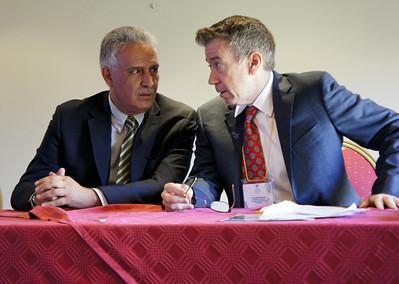
The inaugural conference, June 23-25, attracted nearly 120 healthcare providers, researchers and public policymakers from Morocco, France, Spain, Belgium and the U.S. who developed goals Morocco will strive to meet in the next two years.

The inaugural conference, June 23-25, attracted nearly 120 healthcare providers, researchers and public policymakers from Morocco, France, Spain, Belgium and the U.S. who developed goals Morocco will strive to meet in the next two years.
Indiana State University has thrown its support behind an international effort to reduce infant and maternal mortality rates in Morocco.
Co-sponsored by Indiana State and Hassan I University in Morocco, the International Symposium on Education and Research Strategies to Reduce Morocco Mother and Infant Mortality was held June 23-25 in Marrakesh, Morocco to look at ways the country can lower its infant and maternal mortality rates.
\"We brought together a group of stakeholders with knowledge of the problem who laid out the data and helped to develop goals to work toward,\" said Jack Turman, Jr. dean of Indiana State\'s College of Nursing, Health and Human Services and an expert on maternal and infant mortality who served as one of the conference co-chairs.
The inaugural conference attracted nearly 120 healthcare providers, researchers and public policymakers from Morocco, France, Spain, Belgium and the U.S. who developed three goals Morocco will strive to meet in the next two years, including:
• Improving infant health by developing a media campaign and educational materials for pregnant women in Morocco on the benefits of breastfeeding.
• Improving maternal health by developing educational materials about the relationship between mental health and pregnancy, and materials for fathers on the importance of prenatal care.
• Improving public health by developing a model community maternal/infant health center for student training, vaccinations, breastfeeding education and parent training.
American experts from Indiana State, The Ohio State University, and the University of Nebraska Medical Center held sessions on topics dealing with: public health approaches to reducing maternal, infant mortality, caring for high-risk mothers and infants, and the roles of midwives in the care of pregnant women.
On the final day of the meeting, attendees worked together to develop the goals outlined above. Teams were formed to work on each goal. Teams will report on the progress toward the goals at the next symposium in 2016.
\"There are people doing really great things in Morocco; we are glad to partner with them to advance maternal and child health,\" Turman said. \"I hope our work will help bring good maternal care to every region of the country that results in the reduction of maternal and infant mortality.\"
In Nov. 2013, Hassan I University President Ahmed Nejmeddine and Vice President Ahmed Fahli visited Indiana State and spoke with Turman about the universities collaborating around a major public health issue in Morocco, such as infant and maternal mortality.
Morocco has an infant mortality rate of 29 deaths per 1,000 babies. Deaths are often due to infection, lack of neonatal resuscitation, babies not being kept warm after birth and high preterm birth rates.
In comparison, Indiana has an infant mortality rate of 7 deaths per 1,000 babies, which Turman said has government officials concerned because the U.S. has a goal to keep infant mortality rates below 6 deaths per 1,000 babies.
Unlike the U.S., Turman said Morocco also struggles with its maternal mortality rate that has reached 112 deaths per 100,000 births. The deaths of the mothers are often the result of infection and lack of access to medical care, especially prenatal care.
\"In the U.S., prenatal care and regular follow-ups of mom and baby are routine, but many lack access to these services in Morocco. We need to design strategies to improve the access to these routine services for all women and infants,\" he said. \"First, we need the people in the country to buy into the importance of prenatal care. For many women who live in rural, high poverty areas lacking prenatal care is the norm, we need to change that.\"
The country also struggles with a healthcare workforce shortage. Midwives in Morocco are burdened with much work.
Turman said Morocco would benefit from increasing its maternal/child health workforce to help with deliveries and providing basic education materials, especially to younger populations so they can be educated on topics early.
He said the symposium goals are \"doable, focused and inexpensive\" and expects the groups to meet them during the next two years, though Turman also recognizes that there may be barriers in public perception that need to be overcome to be completely successful.
\"If we learn that there are barriers, which is the case all over the world, then we may have to rethink the goals and how to approach them,\" he said. \"Even so, we will have learned something and none of what we\'ve done here will be a failure.\"
Writer: Betsy Simon, media relations assistant director, Office of Communications and Marketing, Indiana State University, 812-237-7972 or Betsy.Simon@indstate.edu
Contact: Jack Turman, Jr., dean of Indiana State\'s College of Nursing, Health and Human Services, Jack.Turman@indstate.edu